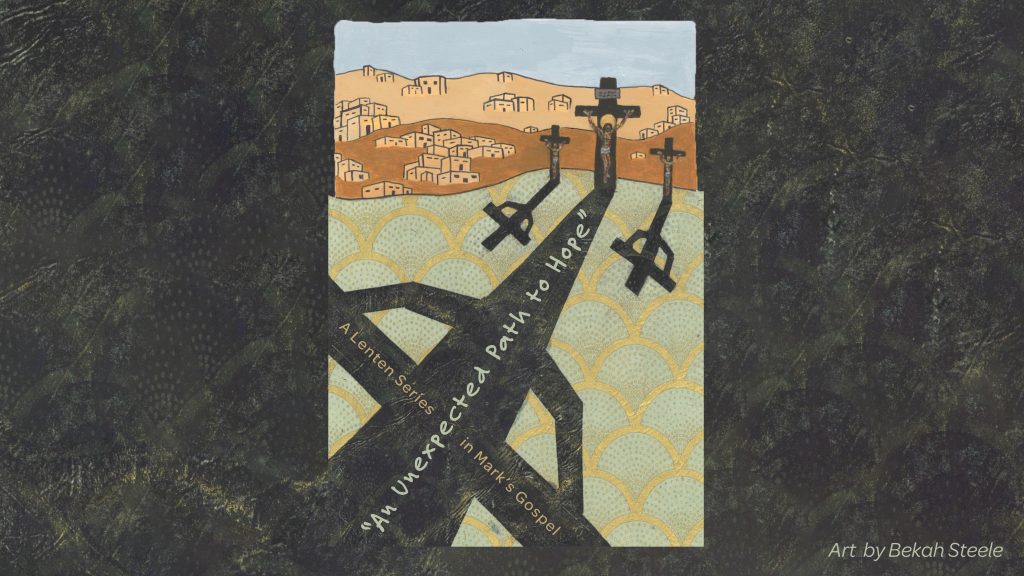Passage: Mark 15:6–20
Guide for Group Discussion or Personal Reflection
Sermon Summary
The most climactic moment in all of world history occurred when God’s son, the world’s true king, was crucified. If we meditate deeply upon the story of Jesus’ rejection and crucifixion—seeing it for what it actually is—we will see God’s love for us, and the nature of his kingdom rule, in a much clearer light.
In Mark’s account of Jesus’ crucifixion, Mark first highlights how Israel rejected its true king. When given the choice of which prisoner they wanted to see released, the crowds, stirred by the chief priests, asked for Barabbas, a murderer and insurrectionist, instead of Jesus. In choosing Barabbas over Jesus, the people were doing more than choosing the release of a criminal, rather than an innocent man. Rather, they were choosing between two different visions for God’s kingdom and two different approaches to bringing it. By choosing the insurrectionist approach, which prioritized power and dominance, they rejected Jesus’ approach of bringing the kingdom through self-giving sacrifice.
Next, Mark illustrates, through irony, how Jesus is in fact Israel’s true king, and the rightful ruler of the whole world. By dressing him mockingly in a purple robe and a crown of thorns, jeering, and giving false homage, the soldiers unknowingly coronate the rightful king, who then ascends to his throne—on a cross! In the paradox of all paradoxes, God rules his world and ushers in his kingdom from a cross—an instrument of torture meant to annihilate a person’s very identity. God’s rule comes to earth, then, not despite, or even after, the cross, but on the cross and through it! This truth creates a whole new ethic among those who receive it—an ethic based on self-giving, sacrificial love.
This calls for a response of repentance and faith. We need to turn from of our old approach to life—marked by trusting in ourselves and asserting ourselves—and turn instead to receive Jesus’ sacrificial love by faith and to follow him in his upside-down kingdom ethic. This also calls for us to value both Christ’s kingdom and his cross, without prioritizing one over the other. Lastly, this calls for worship. See how great the love of God is for us, for it was love that drove Jesus to the cross and held him there!
Sermon Outline
- The Rejection of the King (15:6-15)
- The Reign of the King (15:16-20)
- Responding to the King (15:29-32; 39)
Group Discussion & Personal Reflection Guide
Re-read the passage (Mark 15:6-20)
The Rejection of the King
Q) Re-read Mark 15:6-15. How is Barabbas described? What do you think was appealing to the crowds about releasing Barabbas?
Q) What was the chief priests’ role in the process of Jesus’ rejection? What was their motivation?
Q) Pastor Bobby described how the choice between Jesus and Barabbas was more than the choice between an innocent man and a criminal, but rather the choice between two different kingdoms and two different approaches to bringing God’s kingdom on earth. Which kingdom and which approach did Barabbas represent, and why? Which kingdom and which approach did Jesus represent, and why?
Q) What are some present-day examples of ways that we’re tempted to desire a different kingdom than God’s kingdom and a different approach than Jesus’ way of self-giving love? (You could answer on either an individual level, or a corporate level).
The Reign of the King
Q) Re-read Mark 15:16-20. How many different ways is Jesus mocked as king in these verses? How is this an example of irony?
Q) In his sermon, Pastor Bobby said: “It is unmistakable here that God’s reign is not in spite of the cross, or even after the cross…but God is here, in Christ, reigning from the cross.” How would you explain this distinction, and why it matters, in your own words? What does the fact that God reigns from a cross reveal about the nature of his rule?
Q) In his sermon, Pastor Bobby said that Jesus’ sacrificial, substitutionary, death on the cross not only accomplishes our salvation, but also sets the tone/shape for the ethics of his kingdom. Think together as a group of some of the “kingdom ethics” that Jesus taught—e.g. in the Sermon on the Mount. How does Jesus’ sacrificial, substitutionary for us empower us to:
- Love our enemies (Matt. 5:43-48)
- Give to the needy (Matt. 6:1-4)
- Examine our hearts for sins like anger and lust, rather than just our outward behaviors (Matt. 5:21-30)
- Not store up treasures in heaven (Matt. 6:19-21)
- Be people of our word (Matt. 5:37)
Responding to the King
Q) In his sermon, Pastor Bobby said that one way we need to respond to Jesus’ crucifixion is that we need to “keep the kingdom and the cross together.”
- What happens when we emphasize the cross (atonement, our own sin and need for personal forgiveness, etc), but de-emphasize the kingdom (the community ethic that flows from Jesus’ love?)
- What happens when we emphasize the values of God’s kingdom (the ethic of justice, love, peace, holiness, etc that God wants us embody), but de-emphasize the cross?
Which are you most likely to underemphasize—the cross or the kingdom—and why?
Additional Application Questions
Q) How else would you like to engage with God this week?
Q) How can you tangibly care for those in your community this week, both inside and outside of the church?
Prayer
Spend time praying for yourselves, our church community, the North Shore community, and our nation and world—particularly those most vulnerable.

